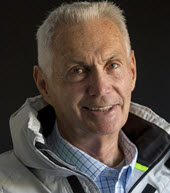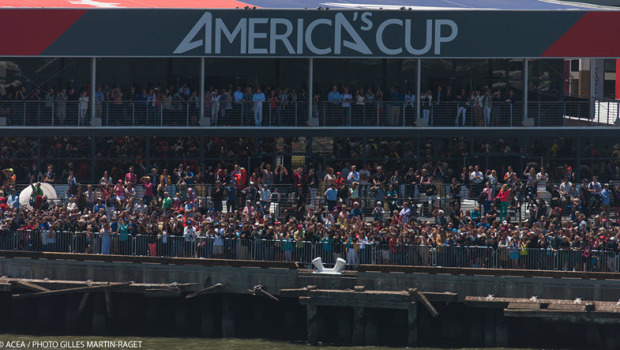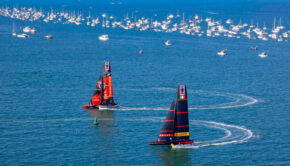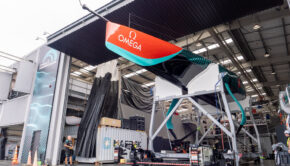Maximizing commercial opportunities for the America’s Cup
Published on October 14th, 2014
The theme for the 34th America’s Cup was The Best Sailors. The Fastest Boats. What will be the theme for the 35th America’s Cup? No word yet, but we always liked the clip from the 1996 movie Jerry Maguire…. Show Me The Money
In search of the money is Dr. Harvey Schiller, who has been appointed as Commercial Commissioner for the 35th America’s Cup, a position that will be responsible for maximizing the commercial opportunities for the America’s Cup.
Scuttlebutt checked in with Harvey for an update…
Explain the job description.
 The idea that was to put someone in the position so that all of the revenue producing parts of the competitions, as well as the activation of sponsorship, the integration into television broadcast and all the other elements. With most sport’s organizations, they avoid those kinds of conflict because there’s a league authority for the championship. And the league, through their staff and their commissioner, coordinate all the activities. This eliminates any kind of what you and I would call ambushing for the event, breakdowns in terms of what the individual teams would be expecting in their exposure.
The idea that was to put someone in the position so that all of the revenue producing parts of the competitions, as well as the activation of sponsorship, the integration into television broadcast and all the other elements. With most sport’s organizations, they avoid those kinds of conflict because there’s a league authority for the championship. And the league, through their staff and their commissioner, coordinate all the activities. This eliminates any kind of what you and I would call ambushing for the event, breakdowns in terms of what the individual teams would be expecting in their exposure.
There’s a lot of money that’s invested in this thing, not just for the organizing committee, but for each of the teams. And every sponsor, whether it’s Prada or Emirates or any of the others, they all want to get the maximum return from their presence. And I think the whole idea of this thing is to work together, whether it’s signage or how the broadcast – in terms of the host feed and others – is able to give the most exposure for the sponsorship side, as well as to avoid some of the pitfalls that you have in production and other things.
By nature of the format, the America’s Cup tends to stop and start. How big a hindrance is that to the commercial objectives?
The biggest weakness commercially for events like America’s Cup is that you can’t commit the sponsor beyond the current years of the Cup. The good thing is that you’ve created more vehicles for the sponsors by having the AC World Series, and hopefully more attention from the public.
But you can’t say to a broadcaster, whether it’s here or internationally, “Okay NBC, we’ll give you the rights for the next 12 years.” Because they’ll take – to protect it, they’ll pay big money for that. And that’s what most sport leagues do. The Olympics are tied up by NBC through 2024. So in the past, you could not do that. So the goal here is to be able to deliver to the teams the ability to carry their sponsorships beyond 2017. And that I would think is in their best interest.
This is a priority in how can we work with the teams to keep this machine going in to the future, because the biggest breakdown they’ve had is the starting all over again. And people have been critical, saying, “You had this great, great event at the end and it drew so much global attention. You let it die down for a while. Why did that happen?” And the answer is, you don’t know who the teams are.
There’s no commitment after that day, and you got to start working with the Challenger or Record on the Protocol. Those are not easy negotiations that you might expect, because each one wants to get their bang for the buck. So one of the first things we were able to accomplish was a common agreement among the entered teams to participate in the America’s Cup World Series in 2018 – and that’s a leap of faith as well. So no matter who wins the America’s Cup in 2017, the America’s Cup designation will be used for that World Series in 2018, and hopefully beyond. They didn’t commit beyond 2018, but for 2018. That’s a big jump.
So as much as the America’s Cup seeks commercial sustainability, the event format seems to be its biggest obstacle.
I think you’re absolutely right. And I think there are two possible answers to get through that. One is, let’s just say you could get all of the competitors to agree to let the current event authority negotiate TV deals through 2021. Once you do the deal, deliver it, to whoever is the winner, a proportion of those funds that recognize the years ahead is part of it.
When I was sitting with some of the folks on that last day of racing in San Francisco, before the race was finished, I said, “You know, if Emirates wins this thing, it would seem to me to be in the best interest to try to keep the elements of the organizing committee here together, to keep that impetus going in terms of TV and marketing.” And I still believe that. Otherwise, you win the event, and you must start from scratch, losing important momentum.
The other possible answer – and I know it’s been discussed but it’s never been accepted and I think it’s going to take some time for people to really grasp on to it – is the idea of franchises.
There’s no continuing asset value beyond the current Cup. With all the investment that’s put into each team – at the end of it, they wind up with a boat and big numbers. So if it’s going to reflect the same asset value that Formula One teams have or NASCAR teams have or NBA and NFL franchises or the Premier League, it’s having some type of franchise operation that has some value to it that you can transfer or sell, or grow it or do a bunch of other things. It doesn’t limit the number of competitors at all. It allows other competitors to come in for a certain franchise fee. Anyway, we’re away from some of that right now.
How do you overcome the appearance that you work for the event organizer, the defender, and not for all the involved teams?
The first meeting I had with all the teams, the first thing I said to them was, “It’s a new position, but everyone in the room has to understand: I don’t really care who wins.” I said, “I’ve been a commissioner before in the college world. At the end of the competition, there’s a winner. And everyone in the room should understand that they’re going to be treated fairly, equally, because again, it doesn’t matter. It doesn’t matter to me who wins at all.”
It’s like a friend of mine said years ago, “The thing that angers teams, and coaches, and athletes, is that the officials don’t care who wins [chuckles].” Everybody wants to be favored. They want something to go their way. But in this regard, my marching orders are to ensure that everybody works together and gets the full value of their participation.
It is important that everybody understands that it’s not about me, it’s about them. First is, try to make it competitive and we want people working hard to win. But where there are common elements, let’s see how we can get those together.
The America’s Cup has a bit of history wherein the competition has not always appeared fair. How do you overcome that?
When I got back to New York after Oracle completed their epic comeback victory, I had lunch with a head of a major, major public relations firm, and he said, “Boy, you guys really did a good job to keep Oracle in the game. You really manipulated that. You guys did hell of a job with the way you manipulated their comeback.” I said, “What are you talking about?” He said, “I know you cheated to get in there.” This is a sophisticated person who believed that when Oracle was down 1-8, and Emirates was leading what would be the final deciding race, we had the power to stop the wind in San Francisco Bay so the Kiwis would miss the time limit.
I think that when you run an event, there are – to be successful, my view – there are three things that you have to accomplish. First thing is that you have to have security and safety for the event. Otherwise, if the element of danger comes in, then that’s not just a distraction, it could mean the event can’t continue. The second is that the competitors should have all fairness in the field of play, whatever that is. It doesn’t matter if it’s on the water, on a pitch, in a stadium – whatever it is, that every competitor is equal within the field of play. And the technical sides of that – the officials, the timing – all of that fits in to make sure it’s fair for the competitors. And then the third thing is how you message that, and that means that you have to have a strong and direct relationship with the media, whether it’s print or electronic or however it is in today’s world, because they’re telling the story to the rest of the world and they’re editorializing it after the event. The media become the measure of whether an event is successful or not.
Oracle Team USA owner Larry Ellison was rumored to have spent hundreds of millions on hosting the 34th America’s Cup. That seems like a big hole for you to step up from.
I hate to avoid a question. I was never really on the inside of those financials, so I can’t say, but I was at the press conference when Larry was asked how much he put into it. I think it’s clear that it was obviously financially supported. To what tune? I don’t know. I can’t answer that. I do know that going forward, our goal is to use all the different forms of revenue that we can – ranging from sponsorship, media, and everything else – to fund the event without having any individual having to contribute. I know what the budget is, and I know what the numbers of expectation are and how those become reality. It should be a self-funding kind of event if you do it the right way.
Can you list a couple of areas that are key to achieving commercial sustainability?
The major part is sponsorship and the contributions that venues make, which is a combination of things, whether it’s government participation, if that’s what’s going to take. When we do the America’s Cup World Series events, whether they’re in Great Britain or France or wherever they are, all of those venues are going to have to depend upon some kind of local support to keep things going. How you sustain these fees financially is a very complex mixture of things to make it happen. I mean, that’s just the history of events, no matter what sport it is.
That’s a big change from the previous AC World Series model where the venue did not hold all of the financial risk.
I think the goal here now is to have each of the World Series venues cover the logistical cost, other than the cost to bring the boats to the venue. But whatever costs there are to run the event, wherever they are, whether it’s security, what onshore and offshore cost there may be, it could be everything from parking to lease support. So they all know that upfront. They’ve all been given a number which, obviously, there is a lot of back and forth as you could expect.
MORE: Harvey indicated there would be 4 to 5 AC World Series events in 2015, but no word yet on when the schedule would be released.









 We’ll keep your information safe.
We’ll keep your information safe.